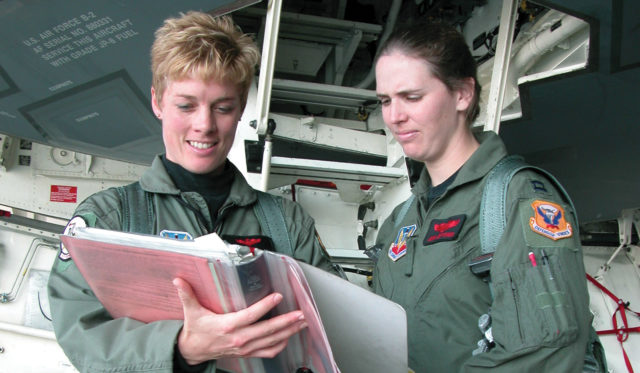Out Lesbian Named First LGBTQ Commandant at U.S. Air Force Academy

Less than six years after the repeal of “Don’t Ask, Don’t Tell,” a decorated out lesbian service member made history when it was announced she would become the U.S. Air Force Academy’s next commandant. This is the first time the institution will be led by an LGBTQ director.
Former bomber pilot Col. Kristin Goodwin, who currently serves as the senior military assistant to the secretary of the Air Force, previously led the 2nd Bomb Wing at Barksdale Air Force Base in Louisiana as the squadron’s first female commander.
USAFA Lt. Col. Allen Herritage, the academy’s director of public affairs, commended Goodwin for her “outstanding service and leadership credentials” and claimed her experience will “strengthen the academy’s continued drive toward excellence.”
In what’s generally considered a formality, the Senate still must confirm Col. Goodwin, who is slated to take charge of 4,000-plus cadets and 300 Air Force and civilian personnel at the Colorado Springs academy.
Lesbian Mother Finally Allowed to Talk About Homosexuality With Her Children
The Washington State Supreme Court overturned a 2011 custody ruling that prohibited a lesbian mother from discussing her sexual orientation with her children. When Rachelle Black came out to her conservative Christian husband six years ago, the court decided to award primary custody to the father, and that Black was to “refrain from having further conversations with the children regarding religion, homosexuality or other alternative lifestyle concepts.”
In April, the court ruled that the original decision was unconstitutional because it “considered Rachelle’s sexual orientation as a factor” and granted an “improper bias” on other proceedings involving this family.
HB2 Gets Reworked—Not For the Better
On April 14, the U.S. Justice Department determined it would end its battle with the state of North Carolina over the HB2 bill, otherwise known as the “bathroom bill.” The Justice Department and attorneys for North Carolina filed a joint dismissal after the state passed a replacement, House Bill 142.
The new bill, signed by current North Carolina Gov. Roy Cooper, is sim-ilar to the original in that it keeps in place a ban on municipalities passing non-discrimination ordinances.
LGBTQ equality advocates were not impressed.
“The Trump Administration may want to use the fake repeal of HB2 as an excuse to further turn their backs on the transgender community, but the rest of us aren’t going to give up that easily,” said James Esseks, director of the ACLU’s LGBT Project. “We’ll continue this fight as long as it takes to truly strike down this disastrous law for good.”
Lesbian Wins Fight Against Discrimination in the Workplace
On April 4, the 7th Circuit Court of Appeals in Chicago ruled that LGBT people are protected from workplace discrimination under the 1964 Civil Rights Act. It was the first time a U.S. appeals court weighed in on whether the federal non-discrimination law applied to the LGBT community.
Kim Hively, a former teacher at Ivy Tech Community College, alleged she was denied promotions and eventually let go from her position because she is a lesbian. The April decision allows for her case to be sent back to a federal court in Indiana.
“Hively represents the ultimate case of failure to conform to the female stereotype … she is not heterosexual,” Chief Judge Diane Wood wrote in her opinion. “Hively’s claim is no different from the claims brought by women who were rejected for jobs in traditionally male workplaces, such as fire departments, construction and policing.”
The 8-3 decision was hailed as a landmark by LGBTQ rights groups.
“Ninety percent of Americans already believe that LGBT employees should be valued for how well they do their jobs—not who they love or who they are,” said Greg Nevins, director of the employment fairness program at Lambda Legal. “Now, through this case and others, that principle is backed up by the courts.”
This ruling comes just three weeks after a court in Atlanta ruled in favor of employers, stating they aren’t prohibited from discriminating against LGBT employees. On March 10, the 11th Circuit Court of Appeals in Atlanta ruled that discrimination against lesbian, gay, bisexual and trans-gender people is justifiable. In a 2-1 ruling, the court denied the expansion of workplace protections for the LGBT community under Title VII of the Civil Rights Acts of 1964, which does not list sexual orientation as a protected class against discrimination.
The conflict between circuit courts on whether sexual orientation is a protected class under the law could lead to the issue being argued in front of the U.S. Supreme Court.
LGBTQs Erased from U.S. Census
Questions on sexual orientation and gender identity will not be included in the 2020 U.S. Census, the bureau announced in March.
An original draft for the decennial survey showed questions for LGBTQ people to identify themselves were being considered—for the first time ever. The Census Bureau sent that draft to Congress, but the next day, said those questions were included as a mistake.
No U.S. Census or American Community Survey (a yearly effort that tracks population demographics) has ever included questions pertaining to sexual orientation or gender identity. Though in 1990 same-sex unmarried partners were tallied by the census, there have never been individual questions allowing someone to self-identify sexual or gender orientation.
According to a statement, the Census Bureau said the report, which included the proposed questions on identity, was released “inadvertently” and it had to be corrected before being sent to Congress.
“Our goal is a complete and accurate census,” bureau Director John H. Thompson said in a statement.

What Do You Think?